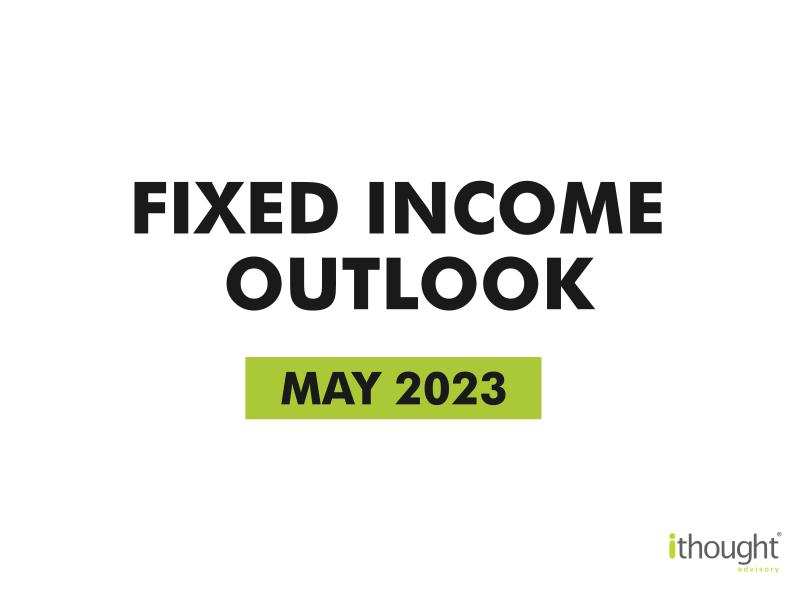
Every month, we study what’s happening in fixed-income markets. This month, we’re delving into:
- Federal Reserve Meeting – Setting The Tone For Global Monetary Policy?
- Tax Loopholes: Should You Exploit Them? (MLD)
- Equity Savings Funds: How Do They Measure Up?
Federal Reserve Monetary Policy – May 2023
All eyes are on the Federal Reserve’s response to the inflation challenge. As far as inflation is concerned, the worst is behind us. The logistical bottlenecks of 2021 and 2022 are no longer a concern. While the labour market is tight now, it could weaken. By and large the stickiest parts of inflation are loosening up. Even though inflation is outside the Fed’s comfort zone, the trend is downward. In line with expectations, the Fed raised interest rates by 0.25% in May. Going forward, the outlook is less certain and the Fed will adopt a data-driven approach to policy actions.
Over the last few years, macros have kept the Fed on its toes. The Fed’s priority in 2020 was handing out cash while the economy remained shut. In 2021 the Fed focused on bolstering market confidence. In 2022 they were combatting high inflation. In 2023 the Fed must navigate a tight labour market, high inflation, the risk of a recession, and a banking crisis.
This is no easy task. On the one hand, oil could play spoilsport. In April, OPEC announced production cuts that sent oil prices soaring overnight. The Ukraine war taught us that rising energy prices can spiral into an inflation problem where monetary policy has little effect. On the other hand, the Fed’s messaging so far has warned of “a mild recession in the second half of the year”. We’re closer to that vague deadline than most policymakers would like to admit. Tight policies in tough economies cause harm. But loose policy for too long brought us here. So, the real question is which is the lesser of two evils.
Tax Loopholes: Should You Exploit Them?
By and large, being a cost-conscious investor is a good thing. It drives you towards tax-efficient strategies and low-cost products. Regulatory oversight results in tax arbitrage. So, the flavour of the month changes to whatever works. In the name of tax efficiency, investors have entertained many products as vehicles for wealth creation. These include stocks, mutual fund dividends, MLDs, and target maturity debt funds. While these are great products, the concern is about suitability.
Tax speculation is a hobby. Those who predict and anticipate the government’s actions are often wrong. How many of them predicted the changes to MLDs? Or who foresaw the sea change that would affect debt mutual funds?
Investors are flocking to a new kind of debenture. Technically, this product has the tax efficiency of MLDs and the features of a debenture. It’s better to err on the side of caution and avoid contended products. We know how hard regulators came down on cryptocurrency taxation.
Loopholes get plugged. If you rely on tax arbitrage for wealth creation, your investment options reduce. Is narrowing your options worth it?
Equity Savings Funds: A Good Alternative?
It’s never fair to compare the performance of debt products against equity products. Yet, we constantly do it. Sometimes we benchmark fixed deposits to equity portfolios during a weak market cycle. Or we use equity indexes to evaluate their debt fund performance. Relative returns between asset classes are ever-changing. In some markets, debt will outperform equity and vice versa. Given that tax benefits favour equity more than debt, are hybrid funds the solution?
One popular choice is equity savings funds. could have anywhere between 15%-50% of equity exposure. Naturally, higher performance comes from higher equity exposure. Equity markets have been unpredictable in 2023. The remaining is split across a mix of arbitrage and debt. Arbitrage instruments offer non-linear returns. By and large, debt funds (with minimal duration and credit risk) generate linear returns. How many fixed-income investors can bear periods of negative or no returns? Moreover, do they score higher on tax efficiency?
The last one-year performance (category averages taken) of arbitrage funds and equity savings funds over low-duration funds:
| TAX SLAB | ARBITRAGE | EQUITY SAVINGS | LOW DURATION |
| 0% | 4.33% | 3.12% | 5.33% |
| 5% | 4.33% | 3.12% | 5.06% |
| 10% | 4.33% | 3.12% | 4.80% |
| 15% | 4.33% | 3.12% | 4.53% |
| 20% | 4.33% | 3.12% | 4.26% |
| 25% | 4.33% | 3.12% | 4.00% |
| 30% | 4.33% | 3.12% | 3.73% |
| 39% | 4.33% | 3.12% | 3.25% |
Takeaways
Fixed-income investing is not easy. This month’s outlook allows us to add a few new ideas to our decision framework. First, the rest of 2023 will likely shower us with more surprises. Surprises are opportunities to restructure our portfolios and rethink investments. Second, tax arbitrage is not a sustainable strategy for wealth creation. Investors must prioritize their requirements and risk appetite above tax efficiency. Lastly, do the math. Whenever a product is brandished in front of you as an outlier, question its efficacy.